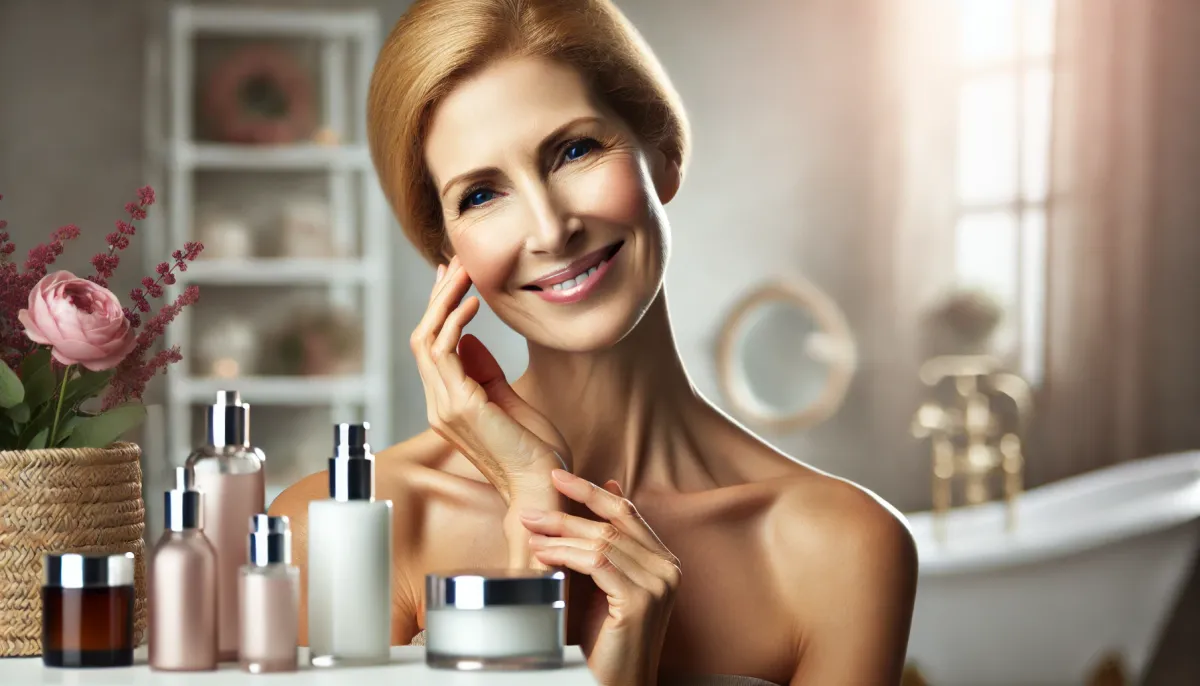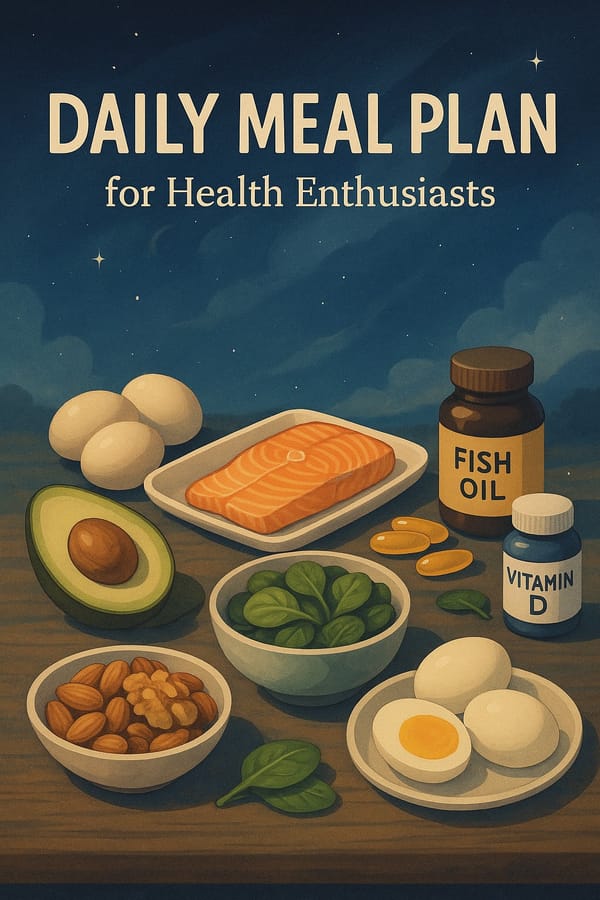Tips for Skincare in Your 50s+: Protect and Rejuvenate Your Skin for Long-lasting Radiance
Discover expert tips for skincare in your 50s+ with scientific insights on sun protection, nutrition, and anti-aging routines for radiant, youthful skin.

Introduction By the time we reach our 50s, many of us begin to notice changes in our skin, such as dryness, wrinkles, fine lines, or thinning skin. These are natural signs of aging, but while it’s challenging to avoid, it’s still possible to keep our skin healthy and slow the appearance of wrinkles effectively.
This article provides insights into how to properly care for your skin in your 50s and beyond, from analyzing skin conditions and adjusting lifestyle habits to choosing effective skincare products. Each recommendation is supported by scientific evidence and expert advice, ensuring that you can maintain strong, glowing skin for the long term.
1. Key Factors Contributing to Skin Deterioration in Your 50s+
1.1 Intrinsic Aging
- As we age, collagen and elastin production slows down, causing the skin to become thinner and less elastic.
- Cell turnover rate decreases, leading to dull and easily dehydrated skin.
- Natural oil production declines, resulting in dryness, roughness, and more prominent wrinkles.
1.2 Extrinsic Aging
- Sun Exposure (UV Rays): UVA and UVB rays damage collagen and elastin, speeding up wrinkle formation and causing dark spots.
- Pollution: Dust, smoke, and toxins in the air create free radicals that damage skin structure.
- Smoking and Alcohol Consumption: Smoking promotes premature wrinkles, while alcohol dehydrates the skin and amplifies the signs of aging.
- Stress: The stress hormone cortisol can trigger inflammation in the skin, dull complexion, and hamper the skin’s natural repair processes.
1.3 Hormonal Changes After Menopause
- The decline in estrogen levels makes the skin thinner and less hydrated, increasing the likelihood of wrinkles.
- Post-menopausal skin is also more prone to hyperpigmentation and uneven tone.
Scientific Evidence
- Research published in the Journal of Clinical and Aesthetic Dermatology has shown that both intrinsic and extrinsic factors contribute to changes in skin structure and function.
- American Academy of Dermatology (AAD) recommends proper UV protection and comprehensive skin care to reduce premature skin aging.
2. Lifestyle Adjustments for Healthy Skin in Your 50s+
2.1 Sun Protection
- Use sunscreen with SPF 30 or higher that provides broad-spectrum coverage.
- Wear protective clothing like long-sleeved shirts, long pants, hats, and sunglasses.
- Avoid staying under direct sunlight between 10:00 AM and 4:00 PM when UV rays are the strongest.
2.2 Stress Management
- Practice relaxing activities such as yoga, meditation, or listening to soothing music.
- Plan your schedule properly to reduce excessive stress.
- Consult a mental health professional if you experience high stress or anxiety.
2.3 Quitting Smoking and Limiting Alcohol
- Smoking directly damages collagen fibers and speeds up skin aging.
- Limit alcohol intake to one drink per day for women and two drinks per day for men to minimize dehydration.
2.4 Getting Enough Sleep
- Aim for at least 7-8 hours of quality sleep per night.
- Adequate rest maintains balanced levels of melatonin and serotonin, essential for skin repair.
2.5 Regular Exercise
- Increases blood circulation and oxygen supply to the skin.
- Suitable exercises include brisk walking, swimming, cycling, or yoga.
- Exercise benefits not only the skin but also muscles, bones, and other systems.
Scientific Evidence
- A study by Harvard Health Publishing found that regular exercise improves blood flow, supporting healthier skin.
- Centers for Disease Control and Prevention (CDC) recommends at least 150 minutes of moderate aerobic exercise per week for optimal health, including better skin.
3. Nutrition for Glowing Skin in Your 50s+
3.1 High-Quality Protein
- Necessary for collagen and elastin production, vital for firm and supple skin.
- Choose protein from fish, egg whites, lean meats, and beans.
3.2 Healthy Fats (Good Fats)
- Omega-3 fatty acids reduce inflammation and strengthen cell membranes.
- Sources include salmon, tuna, mackerel, flaxseeds, and avocados.
3.3 Key Vitamins and Minerals
- Vitamin C: Boosts collagen production and fights free radicals; found in citrus fruits, guava, and strawberries.
- Vitamin E: An antioxidant that repairs skin damage; found in sunflower seeds, almonds, and certain vegetable oils.
- Vitamin D: Essential for cell development; can be obtained from mild sun exposure or supplements.
- Zinc: Helps in wound healing and regulates sebum production; found in oysters, lean meats, and whole grains.
3.4 Antioxidants
- Protect skin cells from free radical damage.
- Found in a variety of colorful fruits and vegetables, such as berries, spinach, broccoli, and tomatoes.
3.5 Adequate Hydration
- Drink about 8 glasses of water per day or adjust based on physical activity and climate.
- Helps maintain the skin’s moisture from within.
Scientific Evidence
- The Journal of the American College of Nutrition found that diets high in omega-3s and antioxidants are linked to fewer wrinkles.
- European Journal of Dermatology concluded that sufficient intake of vitamins and minerals supports strong skin and reduces signs of aging.
4. Choosing the Right Skincare Products
4.1 Cleanser
- Opt for a gentle, sulfate-free formula to avoid stripping the skin of its natural moisture.
- Avoid washing your face with hot water to prevent excess moisture loss.
4.2 Toner
- Helps balance the skin's pH and prepares it for further treatment.
- Look for toners containing antioxidants or hydrating ingredients.
4.3 Serum
- Serums containing retinol (a Vitamin A derivative) help stimulate collagen production and reduce wrinkles.
- Vitamin C serums brighten skin tone and reduce dark spots.
4.4 Moisturizer
- Choose a rich formula with ceramides, hyaluronic acid, or peptides.
- Helps lock in moisture and improves skin elasticity.
4.5 Sunscreen
- Use daily, even if you’re indoors.
- Pick broad-spectrum SPF 30 or higher to block both UVA and UVB rays.
4.6 Additional Products
- Eye Cream: Minimizes dark circles and crow’s feet.
- Face Masks: Choose formulas rich in antioxidants or hydrating agents.
Note: Always patch-test new products on your forearm or behind the ear to check for adverse reactions.
Scientific Evidence
- Dermatologic Therapy reports that long-term use of skincare products can bolster the skin’s barrier function and slow the onset of wrinkles.
- Journal of Cosmetic Dermatology indicates that both retinol and Vitamin C are highly effective in reducing fine lines and hyperpigmentation.
5. Medical and Technological Treatments for Skin Rejuvenation
5.1 Laser Treatments
- Certain lasers, such as Fractional Laser, can reduce wrinkles, dark spots, and stimulate collagen.
- Consult a dermatologist to determine the best laser therapy for your skin.
5.2 Microneedling
- Uses tiny needles to create micro-injuries that stimulate skin repair and collagen production.
- Helps minimize scars and fine lines.
5.3 Botox and Fillers
- Botox targets expression lines, especially on the forehead and around the eyes.
- Fillers restore volume to areas with lost subcutaneous fat.
- Must be administered by qualified medical professionals.
5.4 Other Treatments
- Cryotherapy: Uses cold therapy to stimulate cell function.
- Radiofrequency or Ultrasound Therapy: Helps tighten loose skin.
Scientific Evidence
- Plastic and Reconstructive Surgery journal reports that laser therapy and microneedling show promise in stimulating collagen and improving skin texture.
- American Society of Plastic Surgeons (ASPS) notes that Botox and fillers can effectively reduce wrinkles when performed by experienced practitioners.
6. Caution and Regular Skin Check-ups
6.1 Avoid Unverified Methods
- Beware of overblown claims such as “eliminate wrinkles overnight.”
- Gather information from trusted sources like official medical organizations, scientific research, or a dermatologist’s recommendation.
6.2 Skin Screenings
- Regularly examine moles or spots for any changes in size, color, or shape, as they could signal skin cancer.
- See a dermatologist promptly for any unusual symptoms such as persistent itching, redness, or bleeding.
6.3 Using Dietary Supplements
- Consult a healthcare professional before taking any supplements.
- Make sure they are from reputable sources and clearly labeled.
6.4 Allergic Reactions to Skincare Products
- Discontinue use if you experience irritation, redness, itching, or rashes.
- Seek medical advice for the proper treatment of any severe skin reactions.
Scientific Evidence
- The British Journal of Dermatology recommends annual skin checks for high-risk individuals.
- The World Health Organization (WHO) advises using dermatologist-approved skincare products and supplements.
7. Expert Tips
- Consult a Dermatologist: Develop a personalized, long-term skincare plan that’s right for you.
- Stay Informed: Keep up with the latest scientific findings and research on new skincare ingredients and technologies.
- Observe Your Skin: Pay attention to daily changes in your skin’s condition influenced by diet, weather, stress, or medications.
- Holistic Health: Healthy skin reflects overall health, so maintaining a balanced lifestyle benefits both the body and mind.
8. Conclusion As we enter our 50s, the skin undergoes various changes and age-related deterioration. While this process is natural and unavoidable, proper skincare can still help maintain a vibrant and healthy complexion. Whether it’s sun protection, a balanced diet, suitable skincare products, or comprehensive lifestyle changes, all these factors work together to ensure long-lasting skin vitality.
When approaching skin health, it’s important to adopt a holistic approach, not just focusing on beauty but caring for both your physical and mental well-being—ensuring enough rest, regular exercise, and effective stress management. If you are worried about any skin issues or notice significant changes, consult a medical professional for safe and personalized advice.
Warnings
- The information provided in this article is for educational purposes and does not replace professional medical advice.
- Avoid using any products or treatments with no scientific backing that could pose health risks.
- Discontinue use and consult a doctor if you experience allergic reactions.
References
- American Academy of Dermatology. (2020). Aging Skin. https://www.aad.org/
- Harvard Health Publishing. (2021). Exercise and Skin Health. https://www.health.harvard.edu/
- Journal of Cosmetic Dermatology. (2019). Retinol and Its Benefits for Aging Skin.
- British Journal of Dermatology. (2018). Annual Skin Checks for High-Risk Groups.
- Plastic and Reconstructive Surgery. (2020). Microneedling and Laser Treatments for Collagen Stimulation.
© 2025



